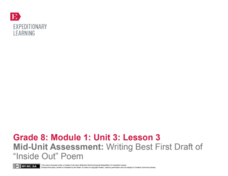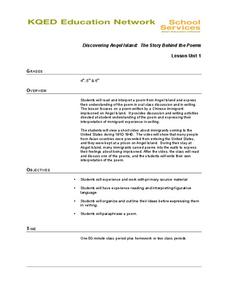EngageNY
Mid-Unit Assessment: Writing Best First Draft of “Inside Out” Poem
As part of a mid-unit assessment, scholars draft their inside-out poems and then work on their "Back Again" poems. Learners use a rubric and graphic organizers to guide their writing.
EngageNY
End of Unit Assessment: Writing Best First Draft of “Back Again” Poem
Team up! Scholars begin working with their research teams to review the components of an effective poem. They then move on to independent work by beginning the end-of-unit assessment. Writers complete the draft of their "Back Again"...
EngageNY
Analyzing Poems from Inside Out and Back Again to Develop Criteria for an Effective Poem
Scholars analyze a model poem to help guide their poetry writing. They use Think-Pair-Share to discuss word choice and meaning in "Papaya Tree" and "Wet and Crying." To finish, they use their discussions to collect evidence on what makes...
EngageNY
Final Performance Task: Becoming Visible Again
It's task time! Scholars complete the final lesson plan of the unit by completing a performance task. Readers begin in groups, working on a task card. Once complete, they move to an independent task, writing responses to a prompt about...
EngageNY
Analyzing a Thematic Concept: The Invisibility of Captives during WWII (Pages 182-188)
Readers complete a word web-based on the word dignity. They use their Understanding Invisibility note catcher to discuss how dignity relates to the theme of invisibility. After group discussion comparing invisibility and loss of dignity,...
EngageNY
Introducing a Thematic Concept in This Unit: The “Invisibility” of Captives during WWII (pages 170-181)
Scholars discuss the phrase identity is erased and how it relates to the theme of invisibility. They use their Understanding Invisibility note catcher to identify how invisibility may occur within a person. They then work on a Gathering...
EngageNY
Character Analysis: Resilience
A Three Threes in a Row note catcher enables class members to dig deeper into the theme in Unbroken. They work with partners for 10 minutes and then rotate around the room to work with others. After regrouping and class discussion,...
EngageNY
Grade 11 ELA Module 1: Unit 2, Lesson 11
What is Hamlet's attitude towards life and death in Shakespeare's Hamlet? Scholars continue reading the play to answer the question, paying particular attention to Hamlet's most famous soliloquy. By holding a discussion and completing...
Curated OER
Collage to Writing
Practice expository and creative writing with your class. Pupils use magazines to find pictures, cut them out, and create a collage. This work of art is then used as a writing prompt. They describe the collage in either a creative or...
Curated OER
Lesson: Allison Smith: What Are You Fighting For?
Trench art is a nontraditional art form created by soldiers in trenches during wartime. Artist Allison Smith connects her art to the American Revolution and the question: "What are you fighting for?" Kids examine her art, how it connects...
Curated OER
Discovering Angel Island: The Story Behind the Poems
Poems carved into the wooden walls of the Asian immigrant prisons on Angel Island provide upper elementary graders an opportunity to study not only the story behind the poems but to also focus on the figurative language employed by the...
Urban Education Exchange
Lessons and Units: The Watsons go to Birmingham—1963 5TH GRADE UNIT
Get ready to read The Watsons Go to Birmingham - 1963 with a lesson about historical fiction. Spanning several centuries, the resource prompts learners to guess the historical era of a story based on a word or phrase in the text. In...
ESL Kid Stuff
Christmas Lesson 1
Little ones sing Christmas carols, complete craft projects, and play word games while learning new vocabulary in part one of two-part ESL lesson series.
ESL Kid Stuff
Christmas Lesson 2
Wrapping presents, singing Christmas carols, writing Christmas cards and learning holiday vocabulary are all wrapped into this one exciting ESL instructional activity.
EngageNY
Grade 10 ELA Module 4, Unit 2, Lesson 20
Using the resource, scholars work in small groups to rehearse a selected scene from Shakespeare's Macbeth. Finally, they present their interpretive dramatic readings to a group of peers or the whole class and complete a self-assessment...
EngageNY
Grade 10 ELA Module 4, Unit 2, Lesson 23
Withered, wild, and bearded are three adjectives that describe the Witches from Shakespeare's Macbeth. Scholars view paintings and discuss how different artists depict the witches. Pupils also complete a Quick Write to analyze Henry...
Curated OER
A Way with Words or Say What?
Students explore the language of Shakespeare. In this literature lesson, students examine words invented by Shakespeare as they interpret their meanings in drawings. Students pantomime the meanings and then write a short story...
Curated OER
A Fair Trade
Learners examine a piece of art to find objects and symbols used by the artist. In this visual art lesson, students look at Jaun Quick-to-See Smith's, "Trade Canoe for Don Quixote." They look for symbols and items that show the artists...
Curated OER
My Own Backyard
Students explore and react to the painting The Road to Santa Fe. In this interacting with art lesson, students locate various objects in the painting. Students copy the angle of objects by using their bodies. Students discuss light and...
Curated OER
Different Points of View
Considering an examination of point of view? Use visual arts to engage learners in of this element of art and literature. Class members select a portrait from the Renaissance Connection and, guided by a series of brainstorming...
Curated OER
The Boy in the Striped Pajamas: Questioning Strategy
Asking questions about the text is a great way for kids to become self-sufficient readers. Use the question-and-response strategy (QAR) to get them thinking about John Boyne's The Boy in the Striped Pajamas. After they read select...
Denver Art Museum
Alien Beauty
"Beauty is in the eye of the beholder," is a popular phrase in our society. The lesson plan here puts the phrase to the test as pupils explore what truly is beautiful through a study of some Japanese folk art. A careful examination of...
Denver Art Museum
Descriptive Haiku
Even though this is technically an art lesson, haiku poetry is actually the main focus! Learners view photographs of Japanese tea caddies. They list five descriptive words for the caddies, then write haiku poems using the caddies as...
Poetry4kids
Simile and Metaphor Lesson Plan
Similes and metaphors are the focus of a poetry lesson complete with two exercises. Scholars read poetry excerpts, underline comparative phrases, then identify whether it contains a simile or metaphor. They then write five similes and...
Other popular searches
- English Language Arts
- English Language Arts Exam
- English Language Arts Games
- Deaf English Language Arts
- English Language Arts Music
- English Language Arts Heroes
- English Language Arts Skills
- English Language Arts Grade 3
- English/language Arts
- English Language Arts Poetry
- English Language Arts Rating=3
- English Language Arts Unit Sc

























